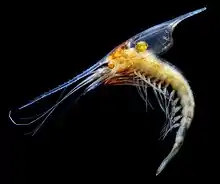zoëa
See also: zoea
English

Zoëa of Gnathophausia
Etymology
From New Latin zōaea, from Ancient Greek ζῷον (zôion).
Noun
zoëa (plural zoëae)
- (zoology) A peculiar larval stage of certain decapod crustaceans, especially of crabs and certain Anomura. Also called the copepod stage.
Usage notes
- In this stage the anterior part of the body is relatively large, and usually bears three or four long spines. The years are conspicuous, and the antennæ and jaws are long, fringed organs used in swimming. The thoracic legs are undeveloped or rudimentary, the abdomen long, slender, and often without appendages. The zoëa, after casting its shell, changes to a megalops. This was originally thought to be a distinct genus.
References
- zoëa in Webster’s Revised Unabridged Dictionary, G. & C. Merriam, 1913
- William Dwight Whitney and Benjamin E[li] Smith, editors (1914), “zoëa”, in The Century Dictionary: An Encyclopedic Lexicon of the English Language, volume V (Simular–Z), revised edition, New York, N.Y.: The Century Co., →OCLC.
This article is issued from Wiktionary. The text is licensed under Creative Commons - Attribution - Sharealike. Additional terms may apply for the media files.